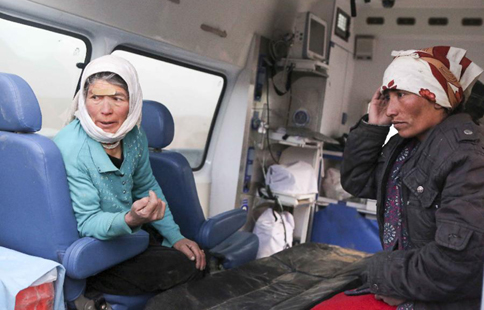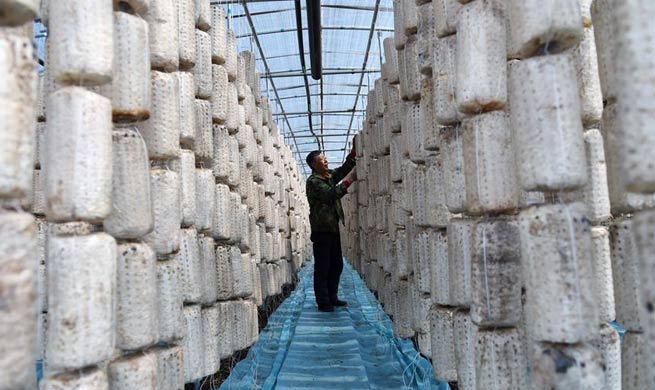by Mohamed al-Azaki
SANAA, May 11 (Xinhua) -- War-torn Yemen has become a place where a child dies every 10 minutes of preventable causes such as conflict, hunger and disease, according to the chief of the United Nations.
Providing aids to victims during the Yemeni civil war has been a real challenge for humanitarian organizations that sometimes have to deal with inflexible government officials, rebel groups or even terrorists.
On the other hand, such humanitarian organizations sometimes face campaigns of criticism from war rival forces and either lose their legitimacy or become unwelcome in many conflict-stricken areas in the country.
One of such world humanitarian organizations working in Yemen is the renowned International Committee of the Red Cross (ICRC), which has recently referred to Yemen as "the world's single largest humanitarian crisis."
Stationed at the heart of the Yemeni capital Sanaa, the ICRC says it continues working to protect and assist victims of the Yemeni conflict despite the accusations of rival parties.
Beside its branches across major Yemeni cities, the humanitarian organization's headquarters in Sanaa has a very large building with several offices specializing in collecting information on war prisoners, war casualties and victims, domestically displaced people and missing ones during the armed conflict.
The chaotic, impoverished Arab country in the southern tip of Arabian Peninsula is facing a humanitarian catastrophe and a threat of an imminent major famine.
More than two years of civil war have ruined Yemen, left over 20 million people in need of emergency humanitarian aid and created the largest food insecurity crisis in the world.
The ICRC's director for the Middle East, Robert Mardini, said a couple of weeks ago that the humanitarian situation in Yemen is deteriorating fast and a massive international effort is needed to relieve the suffering of Yemenis.
"It's estimated that 70 percent of the population in Yemen is in need of some form of humanitarian aid," Mardini said, announcing that his organization is intensifying its operations and doubling its budget for the country this year to reach 90 million U.S. dollars.
The UN says that more than 10,000 people, mostly civilians, have been killed and nearly 42,000 others injured since the war between coalition-backed forces loyal to Yemeni exiled President Abd-Rabbo Mansour Hadi and those allied with the Yemeni Houthi rebel movement escalated in March 2015.
Ground fighting and the U.S.-backed, Saudi-led coalition airstrikes on rebel-held areas have displaced more than three million people so far, whereas seven million Yemenis do not know how to secure their next meal.
Then UN's World Food Programme warned in March that "only three months of food stored inside Yemen," adding that aid workers were racing against time to prevent a famine.
The ICRC said it's surgical team has been deployed to the port city of Hodeidah and another one is due to arrive in Aden, noting the number of ICRC's international workers in the country is being doubled and the number of national staff is increasing by a third.
"The needs are massive and time is short. Famine threatens. At the root of the suffering is the ongoing conflict. It's ripping the heart out of the country. Only 45 percent of medical facilities are functioning. International humanitarian law is being flouted with civilians and civilian infrastructure paying the price," the ICRC chief for the Middle East.
Meanwhile, Yemen depends on imports of 90 percent of its food, medicine and fuel.
"Another major issue that needs to be dealt with are the severe restrictions placed on the import of goods and the movement of such goods and medicines within the country," Mardini said.
The ICRC says it has been denied access to detainees being held by all warring sides, showing concerns over reports of deteriorating detention conditions. It also urges all rival parties to allow ICRC staff to visit people arrested over the conflict and to reconnect them with their families.
"The ICRC remains ready and willing to assist in this area. All people detained in connection with the current conflict should be visited. This could make a strong contribution to the building of mutual trust between the different sides," said the ICRC official.
The UN co-hosted in late April with the governments of Switzerland and Sweden a major international conference in Geneva to appeal for 2.1 billion dollars to avert famine in Yemen this year.
The donor countries pledged only 1.1 billion dollars for humanitarian aid in Yemen, according to UN Secretary-General Antonio Guterres.
Earlier, the UN warned against an attack by Saudi-led coalition forces on the rebel-held Yemeni port city of Hodeidah, the only aid lifeline for millions of Yemeni people who are in desperate need of food and medicine.

















